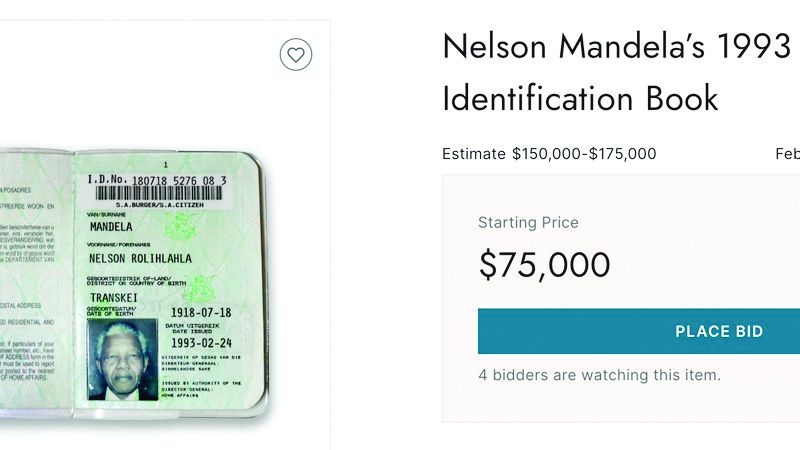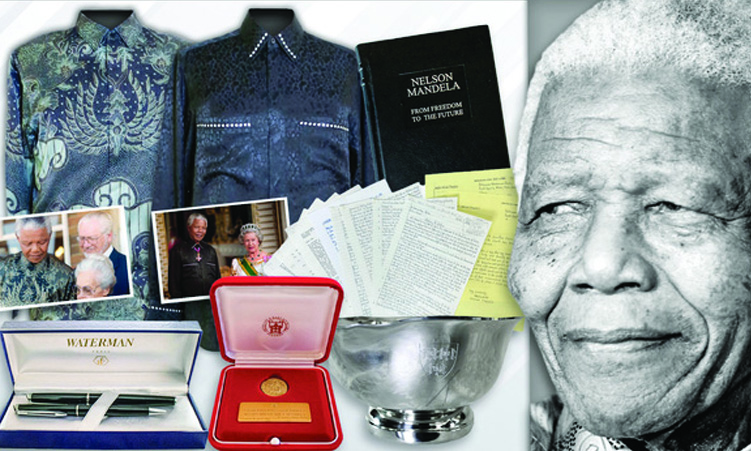South African arts and culture minister Zizi Kodwa has welcomed the decision to suspend the auction of the late former president Nelson Mandela’s personal belongings, including his identity document (ID) book, trademark shirts, hearing aid equipment, spectacles, shoes and 100 other items.
Mandela’s daughter Makaziwe had reportedly initiated the auction with the New York-based Guernsey’s Auction House as far back as December 2021, in a bid to raise funds for the construction of the Mandela Memorial Garden at Qunu in the Eastern Cape.
The decision to auction the items has been criticised by many South Africans, including Mandela’s grandchildren Mbuso and Ndaba Mandela.
Mandela’s stepdaughter, Josina Z Machel, daughter of Samora and Graça Machel, along with Mandela’s daughter Ndileka, have also described the auction sale as outrageous.
The South African Heritage Resources Agency (SAHRA) confirmed this week that the auction was suspended, following the agency’s engagement with Guernsey’s Auction House and Makaziwe.
SAHRA and Makaziwe had been locked in a legal dispute over the auction, with the heritage organisation arguing that the items were part of South Africa’s heritage, while Makaziwe held they were private items owned by her.
The court ruled in Makaziwe’s favour, saying the items were not heritage objects, allowing the auction to go ahead. But the government intends to appeal the ruling.
The auction house only stated on its website that the auction sale had been suspended and did not explain the reasons.

Kodwa said the suspension of the auction sale allowed the legal proceedings to be finalised.
“SAHRA, with the Department of Sport, Arts and Culture and the Robben Island Museum, will continue to appeal the High Court judgement relating to the unpermitted export for exhibition or sale or auction of items associated with former president Nelson Mandela,” he said.
“I reiterate the importance of preserving and protecting the legacy of former president Nelson Mandela and South Africa’s rich cultural heritage. Our cultural heritage defines who we are and maintains the knowledge and memory of where we come from as a nation.”
Duane Jethro, a lecturer in the Department of African Studies and Linguistics at the University of Cape Town, writing on the UCT website, said heritage was a contested concept.
“The state, the nation, private individuals and the market often have competing stakes in making claims to – and about – the cultural value that heritage holds. At times courts are enlisted to mediate such disputes,” he wrote.
Jethro said many South Africans had a strong personal relationship with Mandela, explaining that the outrage directed against the auction sale could be traced to the personal and intimate nature of the items.
“And the fact that their sale feels like transgressing a moral boundary of familial respect. In addition, given his political stature at home and globally, there are many who feel the auction crossed a cultural boundary,” he said.
“The items being put on the block are special for the nation and are tied to the story of the struggle for freedom and democracy.
“This value is intuitively understood as heritage. As a scholar of the cultural construction of heritage and contested public culture, I find this dispute a fascinating illustration of the shifting dynamics of heritage adjudication after 30 years of democracy,” Jethro said.
“Where once heritage was about reconciliation and nation building, it is ever more about struggles over ownership, private property, cultural value and economic gain.”
– IOL News
Stay informed with The Namibian – your source for credible journalism. Get in-depth reporting and opinions for
only N$85 a month. Invest in journalism, invest in democracy –
Subscribe Now!










